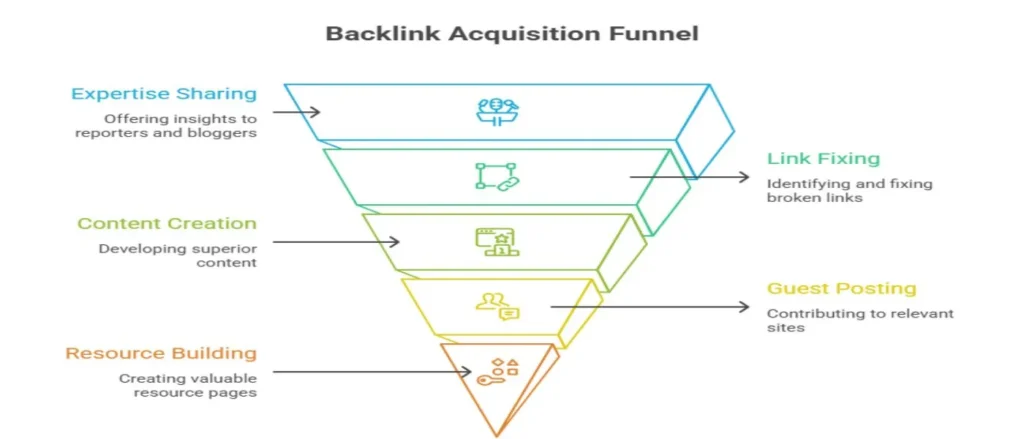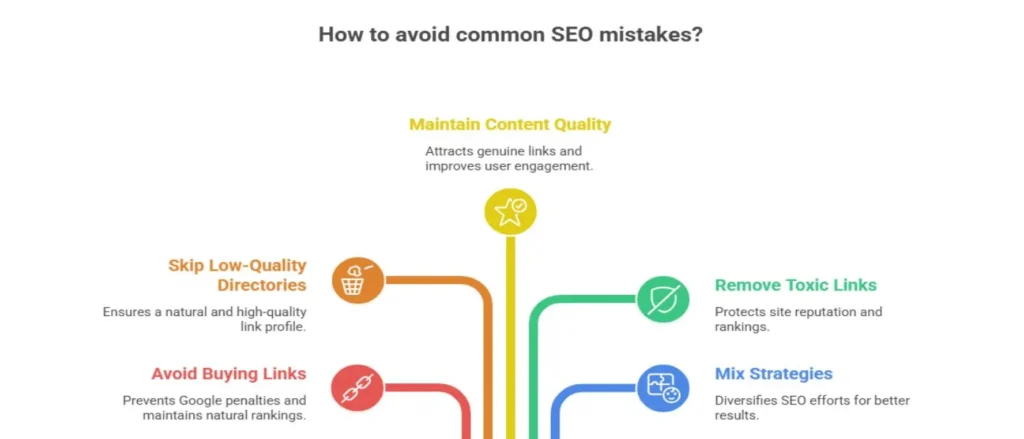Backlinks are like votes from other websites. They tell search engines that your site has good information worth sharing. In simple terms, when a trusted site links to yours, it helps your pages show up higher in search results. This matters more than ever in 2025 because search engines and AI tools look at these links to decide what is reliable. High-quality backlinks build your site’s trust and bring in more visitors who are already interested in your topic.
Getting these links is not about tricks. It takes time and smart work to earn them naturally. This guide pulls together the best ideas from top experts. It covers what makes a link high-quality, why you need them, and step-by-step ways to get them. By the end, you will know how to grow your site’s strength without shortcuts that could hurt you.
You can also read: How To Fix Technical SEO Issues?
What Makes a Backlink High-Quality?
Not all backlinks help the same way. A high-quality one comes from a site that matches your topic and has a strong reputation. Think of it like getting a recommendation from a well-known teacher instead of a stranger. These links boost your site’s ranking because search engines trust them more.
First, the linking site must be relevant. If you write about cooking, a link from a food blog is better than one from a car site. This connection shows search engines that your content fits the conversation. Next, the site needs to be reputable. Look for places with real traffic and good trust scores. Tools can check this by giving a score from 1 to 100, where higher means stronger.
The way the link is placed matters too. It should fit naturally in the middle of an article, not hidden in a footer. The words around the link, called anchor text, should describe what your page is about without stuffing in keywords. Search engines like Google watch for natural patterns. They prefer links that grow slowly over time, not a sudden bunch that looks fake.
Quality beats quantity every time. One strong link from a top site can do more than 100 weak ones. Weak links from spammy places might even harm your site by making it look untrustworthy. Focus on links that add real value, like those in helpful lists or expert guides. This builds a diverse set of links from different places, which search engines reward.
Why High-Quality Backlinks Matter for Your Site
Backlinks are a big part of search engine optimization, or SEO. Their importance dates back to the original Google PageRank algorithm, which treated a link as a vote of confidence. They help your site rank higher for words people search, like “best pizza recipes.” Pages at the top of Google often have many more backlinks than those lower down. This is because links act as proof that others find your content useful.
They bring extra traffic too. When someone clicks a link to your site from a trusted place, they are already curious about the topic. This “warm” traffic stays longer and might buy something or share your page. Backlinks also build trust. If big names link to you, visitors see you as an expert.
In 2025, backlinks will help with AI search tools. These systems pull answers from the web and favor sites mentioned often in good contexts. Even without a clickable link, just being named next to trusted brands builds your reputation. This is called a co-citation, and it makes your site show up in smart answers from tools like ChatGPT.
Backlinks improve your site’s overall score, like domain authority. A higher score means it’s easier to rank for tough search words. They also help search engines find your pages faster by following the link paths. Without strong backlinks, even great content might stay hidden.
12 Proven Strategies to Earn High-Quality Backlinks
Earning backlinks starts with creating content people want to share. Then, reach out in ways that help others. Here are clear steps grouped by approach. Each one comes from real tests that worked for sites big and small.

1. Offer Your Expertise to Reporters and Bloggers
One easy way to start is by helping writers who need quick expert advice. Sites like Help a Reporter Out (HARO), Featured.com, and Help a B2B Writer connect you with journalists. They send daily emails with questions on topics like business or tech. Reply with a short, useful answer based on your knowledge.
If they use your input, they often include your name and a link to your site. Keep your response under 100 words and add why you know the topic. For example, if asked about web design differences, share a simple tip with an example. This has landed links on university sites and news pages. Tools like these are free or low-cost and lead to natural mentions.
2. Fix Broken or Outdated Links on Other Sites
Many websites have links that no longer work or point to old info. This is your chance to help and get a link in return. Use tools like Ahrefs or Semrush to find broken links on sites in your field. Look for pages that list resources, like “top tools for marketing.”
Once you spot one, email the site owner politely. Say something like, “I noticed this link goes to outdated info. Here is my fresh guide on the same topic that might fit better.” Attach a screenshot of the issue. This “Moving Man Method” works because you solve their problem without asking for much. It has earned links from .edu sites and popular blogs.
3. Create Better Content Than What Exists
Find popular articles in your niche that get lots of links. Then make your version longer, clearer, or more up-to-date. This is the Skyscraper Technique. Search for a top post, note what it covers, and add new tips, images, or data.
After publishing, email sites that linked to the old one. Suggest your improved piece as a swap. For instance, if an old tool list is from 2021, offer your 2025 update with fresh examples. This naturally attracts shares and links because your content stands out.
4. Write Guest Posts for Relevant Sites
Guest posting means writing an article for another site’s blog. Pick places that cover your topic and have real readers. Search for “write for us” plus your niche, like “write for us SEO.” Aim for sites with good authority scores.
Pitch a topic that solves a problem for their audience, like “5 Tools for Better Emails.” Include why your brand fits naturally, without hard selling. Once approved, write clear, helpful content with one link back to your site. This builds connections and gets you in front of new people. Avoid low-effort posts; focus on value to earn trust.
5. Build Links Through Resource Pages
Resource pages are lists of helpful links on other sites, like “best guides for beginners.” Search for “resources” or “links” in your field. When you find one, email the owner with a note like, “Your page on marketing tools is great. My free checklist on keyword tips might add value.”
Make your suggestion personal by saying what you like about their site. This polite outreach often leads to a spot on the list. It works because these pages want fresh, useful additions to stay current.
6. Partner with Influencers and Experts
Reach out to influencers who talk about your topic on social media or blogs. Find them by searching your niche on platforms like Twitter or Instagram. Send a friendly message sharing how your content helps their followers, like a free tool they can try.
If they review it or mention you, ask for a link in their post. For bigger reach, offer to collaborate on a video or podcast. Small influencers often work best because they connect with specific audiences. This can lead to shares, links, and even affiliate deals where they earn from promoting you.
7. Make Shareable Tools, Infographics, or Interactive Content
People love free things that save time. Build a simple tool, like a calculator for email open rates, or an infographic showing SEO stats. Use easy makers like Canva for visuals. Publish it on its own page so others can link directly.
Promote it on social media and email sites in your niche. For example, a quiz like “What’s Your Marketing Style?” got thousands of links from places like Forbes. Interactive bits, like step-by-step guides or data roundups, draw links because they are fun and useful. Original stats from your research make them even more link-worthy.
8. Share Original Research or Studies
Gather data no one else has, like a survey on what small businesses want in 2025. Use free tools like Google Forms to ask questions. Turn the results into a story with charts and key findings.
Email journalists or bloggers with your unique angle, like “New data shows 70% of sites need better links.” This gets coverage in news or lists, earning do-follow links. Studies show original info gets shared 94% more because it feels fresh and trustworthy.
9. Use Testimonials and Case Studies
If you like a product or service, write a short review of how it helped you. Email the company offering it for their site. Say, “Your tool saved me hours; here’s my story.” They often add your name and link.
For case studies, share your success with a partner and ask to be featured. This mutual help builds goodwill and gets you a backlink. Video testimonials work even better for engagement.
10. Reclaim Mentions and Link to Others First
Search for your brand name online without your site, like “best SEO tips -yoursite.com.” You might find articles mentioning you without a link. Email them asking to add one, like “Thanks for the shoutout; a link would help readers learn more.”
To get links, link to good sites first. Write a roundup of top tools and email each one: “I featured your work; hope you like it.” This generosity often leads to them linking back.
11. Tap into Podcasts, PR, and Trends
Offer to guest on podcasts in your field. Prepare talking points and follow up with a thank-you link to your related post. Hosts usually add your site in show notes.
For PR, write press releases about newsworthy things, like a product launch. Share on media sites and social media. Pitch trending topics to journalists, tying your expertise to current news. This gets links from big outlets like The New York Times.
Start an affiliate program where others promote you for a cut. Give them ready content like screenshots or talking points. This spreads your name across blogs and videos.
12. Name Your Own Strategies for Easy Sharing
Create a unique tip or method, like a simple checklist for links. Give it a catchy name, such as “The Link Boost Framework.” Write a guide showing how it works with real results. People love naming things because it’s easy to reference in their posts or AI answers.
Best Practices for Outreach and Pitches
When asking for links, keep emails short—under five sentences. Start with their name and a compliment. Clearly say what you offer, like “Here’s a guest post idea that fits your readers.” End with a simple ask.
Personalize every message; avoid generic blasts. Show your site’s trust with HTTPS, contact info, and about pages. Follow up once or twice if no reply, but don’t push. Track everything in a spreadsheet to stay organized.
Build relationships on social media by commenting helpfully on posts. Align your profiles with your site for consistency. This makes you seem real and boosts signals to search engines.
Common Mistakes to Avoid

Don’t buy links or join schemes; Google penalizes that, dropping your rankings. Skip low-quality directories or exact-match anchors too often—it looks unnatural.
Never send spammy emails or ignore content quality. Weak posts won’t earn links. Also, don’t forget to check for toxic links; remove them with tools to protect your site.
Over-relying on one method, like only guest posts, limits you. Mix strategies and track progress. Patience is key; links build over months, not days.
How to Monitor Your Backlinks
Use free tools like Google Search Console to see new links and traffic sources. For deeper checks, try Ahrefs, Semrush, or Moz. They show link quality, anchor text, and spam risks.
Watch for traffic jumps from referrals and ranking changes. Aim for steady growth in domain authority. Clean up bad links regularly to keep your profile strong.
In conclusion, High-quality backlinks are your ticket to better visibility and trust online. By focusing on value, relevance, and smart outreach, you can earn them without risks. Start with one strategy, like helping reporters, and build from there. Over time, your site will rank higher, attract more visitors, and grow stronger. Put in the work now, and watch the results come in 2025 and beyond.
Ready to boost your website’s authority?
Contact Influx.pk, A reputed Digital Marketing Agency in Lahore, we specialize in SEO, link building and content strategies that drive long-term growth. Let’s help your brand earn high-quality backlinks and dominate search results in 2025.







